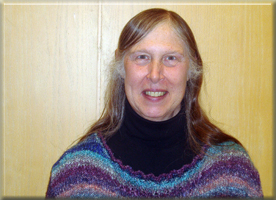Teacher-Scholar Legacies: Mary Friedman
By Jane Albrecht, Professor of Spanish

The big things about Mary Lusky Friedman are the accomplishments many of her students and colleagues on campus and scholars around the world already know about her.
Mary’s record of outstanding teaching and research is bound up with the literary production of the greatest writers of 20th century South America: Jorge Luis Borges, José Donoso, Pablo Neruda, Gabriel García Márquez, Mario Vargas Llosa. A renowned Borges scholar when she came to Wake Forest in 1987, having published The Emperor’s Kites: A Morphology of Borges’s Tales (the Spanish version is simply titled Una morfología de los cuentos de Borges), she subsequently undertook exploration of the narrative fiction of José Donoso, the most celebrated novelist of Chile. Her Donoso project produced what is, to my mind, one of the two greatest cultural events held on this campus in the past 30 years (the other, the visit of Carlos Fuentes): her onstage conversation/interview with Donoso was as riveting and stimulating a conversation as one I had been fortunate to witness years before with Borges. Mary has made extraordinary contributions to Wake Forest University in scholarship and the humanistic education of students, including countless hours dedicated to interviewing and selecting Fulbright scholars and Phi Beta Kappa honorees. In the department and across the College and University, our intellectual debts to Professor Mary Friedman are great.
Now, here are the million little things that do not show up on Mary’s curriculum vitae, yet deserve, indeed demand, to be celebrated.
She boasts a prodigious vocabulary, learned in childhood from Gilbert and Sullivan operettas, which she wields in ardent defense of the study of literature and the humanities. Mary’s office and home are always open to colleagues and students. (She once lodged, fed, and clothed a hapless job candidate stranded for five days by an ice storm). Mary has been a mere co-worker to no one, and mentor to many. A brilliant and funny interlocutor for whom good conversation is sacred, Mary has long presided over a lunchtime tertulia in Greene Hall. During these chats, she might toss off the kind of pithy remark about the Boom authors that could shape a young scholar’s trajectory. It is no wonder so many colleagues have acknowledged and thanked Mary Lusky Friedman in their books.
Mary has performed acts of kindness that have touched many of my colleagues and me personally. Since the day we arrived together at Wake Forest more than 33 years ago — with hospital visits and gifts of food, flowers, and good cheer — Mary has been a rock and a comfort. I am exceedingly grateful for Mary and Michael’s friendship and generosity, which have extended to my children and grandchildren, who carry with them prized possessions and cherished memories from the Friedmans.
“Nadie rebaje a lágrima o reproche / esta declaración de la maestría / de Dios, que con magnífica ironía/ me dio a la vez los libros y la noche.” — J. L. Borges, “El Poema de los Dones”
“A brilliant and funny interlocutor for whom good conversation is sacred, Mary has long presided over a lunchtime tertulia in Greene Hall. During these chats, she might toss off the kind of pithy remark about the Boom authors that could shape a young scholar’s trajectory. It is no wonder so many colleagues have acknowledged and thanked Mary Lusky Friedman in their books.”
Jane Albrecht, Professor of Spanish

